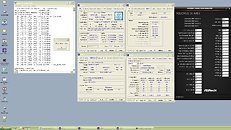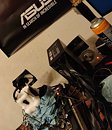Tuesday, July 3rd 2018

Core i7-8700K Overclocked to 7.34 GHz (3c/3t) on Z270 Chipset, Bags SuperPi Record
German professional overclocker Dancop got the Intel Core i7-8700K processor to work on an ASUS ROG Maximus IX Apex (Z270) motherboard, something that's not supposed to work. CPU-Z screenshots seem to confirm this unholy union between the 6-core "Coffee Lake" processor and a 200-series chipset motherboard, using a custom "0084" BIOS dated 11th June, 2018. Dancop then proceeded to overclock the chip to 7344 MHz using extreme cooling, and 2x 8 GB (dual-channel) DDR4-4000 memory. This bench-stable build was then used to bag a SuperPi 32M world-record.
There's a rather big catch, though. Half the cores on the i7-8700K were disabled, and so was HyperThreading (not that it's relevant to SuperPi). The 3-core/3-thread chip was still bench-stable at 7344 MHz, crunching SuperPi 32M in a world-record 7.609 seconds. The clock speed was achieved by dialing up the multiplier to 73.0x, with the base-clock probably untouched, at 100.61 MHz (with the +0.61 MHz probably being variance). Supporting this clock was a blistering core voltage of 1.984 V. A liquid-nitrogen evaporator was used to tame the CPU and motherboard VRM. Find the validation in the source link below.
Source:
Dancop (HWBot)
There's a rather big catch, though. Half the cores on the i7-8700K were disabled, and so was HyperThreading (not that it's relevant to SuperPi). The 3-core/3-thread chip was still bench-stable at 7344 MHz, crunching SuperPi 32M in a world-record 7.609 seconds. The clock speed was achieved by dialing up the multiplier to 73.0x, with the base-clock probably untouched, at 100.61 MHz (with the +0.61 MHz probably being variance). Supporting this clock was a blistering core voltage of 1.984 V. A liquid-nitrogen evaporator was used to tame the CPU and motherboard VRM. Find the validation in the source link below.


75 Comments on Core i7-8700K Overclocked to 7.34 GHz (3c/3t) on Z270 Chipset, Bags SuperPi Record
You don't complain about turning and/or handling in a record-setting dragster, do you?
Actually it shows he used dual channel DDR4-2132MHz Ram with an XMP rating of 3600MHz, and overclocked that to 4148MHz.
The z270 board supports 6 cores with the modification and bios. But no ht!
This cpu can run 6/12 7010mhz cinebench r15 on Maximus X Apex
For overclockers like me, the benchmark is ancient, yes, but it is by far the most difficult. Same settings like in my record, done on a normal win 10 would take at least 12 seconds more. On a normal xp around 10 and on my slipped XP with the same cpu speed but without mem tweaking at least 15 seconds more...
You don't have to love this kind of overclocking, but it's like formula 1...either u like it or u just can't understand why they do this.
Btw... This chip does 5650@1.45v cinebench r15 on aio!
How and/or who provide you the custom bios for the board? Also, why didn't you use a Z370 board? Just curios.
It's not only a BIOS, also a hardwaremod...why did I use z270? Cause on this platform, XP work quite well...and as described above, it's much faster!
I can explain why he used XP and not all cores for the run.
First, XP is allowed by HWbot, the ruling body that sets the rules and standards for such like FIFA does for soccer or the IOC does for the olympics.
As long as the run was done according to the rules about the bench it's fine, the rules state that a Windows operating system is to be used and only Windows, the rules also say with Super PI any Windows version can be used so it's up to the bencher what to use.
CORRECTION:
Super PI can only be ran with Windows versions 7 and earlier with exceptions for Win 8 and 10 - Can be ran with those under certain circumstances but not at large.
In some cases you cannot use the later OS versions because of what's known as the RTC bug.
This causes inaccurate results with certain benchies running Win 8 or Win 10 because those use RTC as part of how the OS operates - So based on that it's not always legal to use Win 10 or Win 8. Some benchies are affected by it, some are not.
XP also gives the best results with Super PI, doesn't make sense to use an OS that will slow it down - As long as the bot says it's OK, then it's OK provided all other rules about it are followed to make it a legit run.
As for not using all cores Super PI isn't multi threaded and using addtional cores doesn't make any difference in the result like it does for Cinebench as an example so it's legal to do that if you want. The result would be the same whether running all cores or not at a given speed in MHz, by disabling cores that's not needed to run it he can clock it higher for a better result. For other benchies like WPrime the number of cores used affects the result so you'd want all cores going for that.
As for the bot being the standard, the same guy that runs it is also the author (At least in part) of CPU-Z and that's also a standard we all use just like GPU-Z is used for GPU's.
Edited for clarity of the post.
I would like to know more about what types of CFL configs actually work on Z270. So you're saying that the 8700K is actually capable of working correctly in a 6C\6C config in the board for general purpose computing?
community.hwbot.org/topic/175489-asrock-z170-mocf-lives-on-coffee-lake-mods/
Disabling cores is allowed under the rules for Super PI because the number of cores used does not affect the computational output/result of the bench.
hwbot.org/news/876_application_3_rules/
hwbot.org/news/879_application_7_rules/
You got killer CPU and pretty decent rams for this and 4 min Pi is crazy. what was CPU temp while benchmark is running? Is it delidded? Many questions.I mean, benchmarking is nice, and it's rewarding to see increases in your scores when you benchmark, but for games its about as useful as a wet sock. Providing the bridge that actually shows us how this translates would do wonders, and the idea of "BIOS Tuning" working when automatic rules are garbage and so many complain about it makes many wonder why... the number of posts I have seen in the past few days on here about problems with ASUS BIOS might make people question why time is invested in this, and not normal usage stability... like great, ASUS board helped benchmarks. But 24/7 usage having fleeting stability raises the question as to how useful doing these things might be. Fix the problems that people encounter every day, rather than the ones that are seen once in a while, would go a long way. I saw this because I used to like ASUS, but I'm not the only one not impressed with how things are with their products lately, and seeing demos like this doesn't help fix those problems. That leaves people with "Great, but I still have this problem" in their mind... and kills brand loyalty.